Why rely on a mobile-responsive site when mobile apps consistently outperform them in user experience? In the debate of Mobile App vs Responsive Website, mobile apps clearly take the lead, offering 3x higher conversion rates compared to mobile websites. They also achieve twice the retention rate within just 90 days of use.
Additionally, mobile apps load up to 1.5 times faster, offering offline functionality and real-time push notifications that responsive sites simply cannot match. In a world where 85% of users prefer apps over websites for ease and convenience, a mobile-responsive site fails to deliver the optimal experience your customers expect.
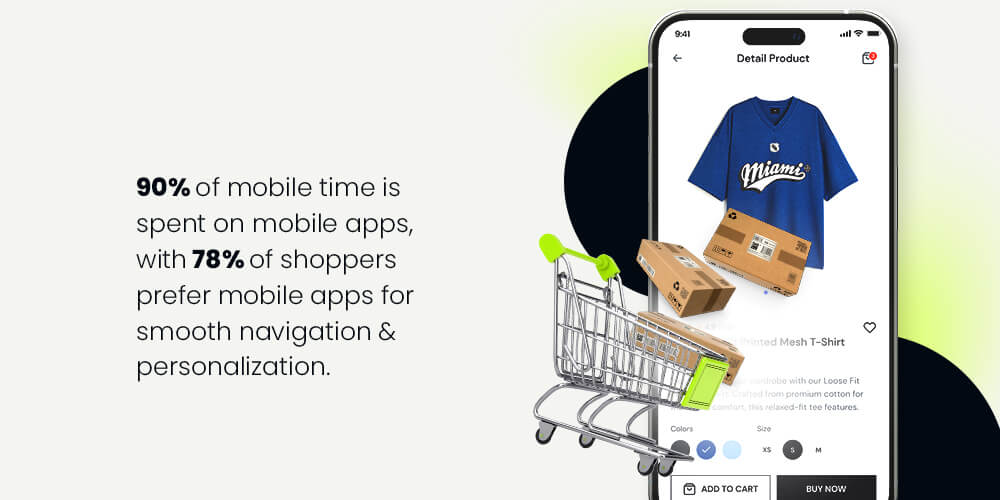
It is crystal clear that businesses that don’t invest in mobile apps will risk falling behind in the face of rising customer expectations.
Mobile App vs Responsive Site: Key Differences
Functionality – Mobile apps excel in functionality, providing access to device-specific features like GPS, camera, and sensors, which can significantly enhance the user experience.
Fitness apps like Fitbit and Nike Training Club use the phone’s built-in sensors (accelerometer, gyroscope) to track user activities like walking, running, or cycling. This sensor integration allows the apps to provide personalized health insights and feedback based on real-time data
Speed – Mobile apps generally perform better than mobile-responsive websites because they are built specifically for the platform (iOS or Android), making them faster and more efficient.
Unlike websites, which have to adapt to different screen sizes, apps are optimized for the device, reducing delays. Plus, apps can store data locally, allowing customers to access content quickly, even when they’re offline.
User Experience – Apps can send real-time push notifications to users, keeping them engaged and informed about updates, offers, or events. This direct communication boosts engagement and creates a more personalized experience that mobile-responsive websites cannot provide.
Moreover, mobile apps let customers set preferences, save settings, and receive personalized content based on their behavior. But, this level of personalization and seamless experience isn’t possible with responsive websites, which lack the deep integration with device features and the ability to store user data in the same way apps can.
Mobile Apps Deliver Personalized Experiences and Save Time
Mobile apps can collect detailed data about how users interact with them. They track behaviors like
- Which products do customers view
- How long they spend on each item
- The search terms
- Items they add to their cart but don’t purchase
- Browsing history
This data is leveraged to offer personalized recommendations, such as “You might also like” or “Recently viewed items“.
Why Mobile Responsive Websites Fail To Deliver Personalized User Experience?
Mobile-responsive websites rely on cookies and browser-based tracking, but when users deny cookie tracking (which is common due to privacy concerns), websites struggle to collect detailed data like product views and cart additions. This limits their ability to offer personalized recommendations, unlike mobile apps that gather deeper insights through direct device integration and permissions.
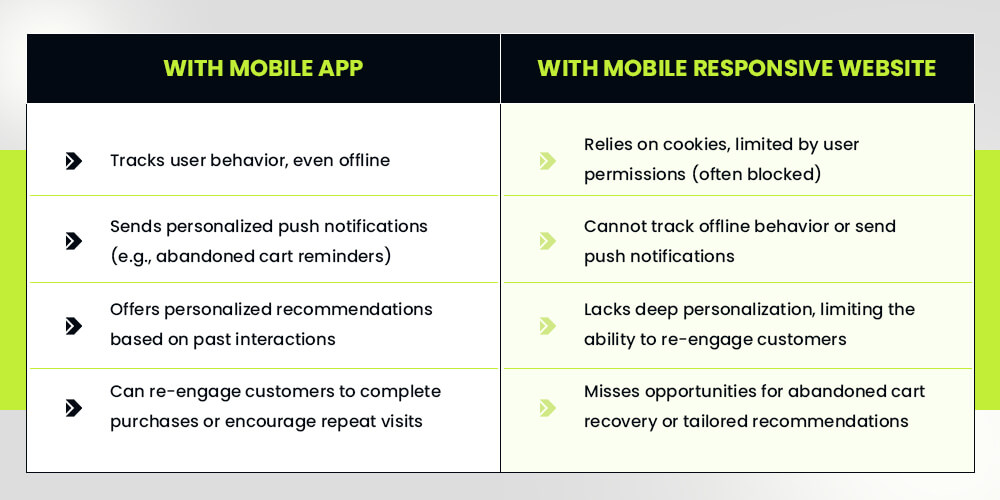
Mobile Apps Allow You To Directly Connect with Customers Anytime, Anywhere with Push Notifications
Mobile apps leverage push notifications to deliver targeted messages directly to users’ phones, enabling businesses to connect with customers in real time. These are time-sensitive offers, reminders for abandoned carts, product updates, or personalized recommendations. Push notifications have a much higher open rate and lead to higher conversion rates.
Without a mobile app, businesses relying solely on mobile-responsive websites miss out on push notifications. Hence, it lacks the ability to send instant, real-time messages to customers. This means businesses must wait for customers to return to the website, it will delay the process and often results in lost conversion opportunities.
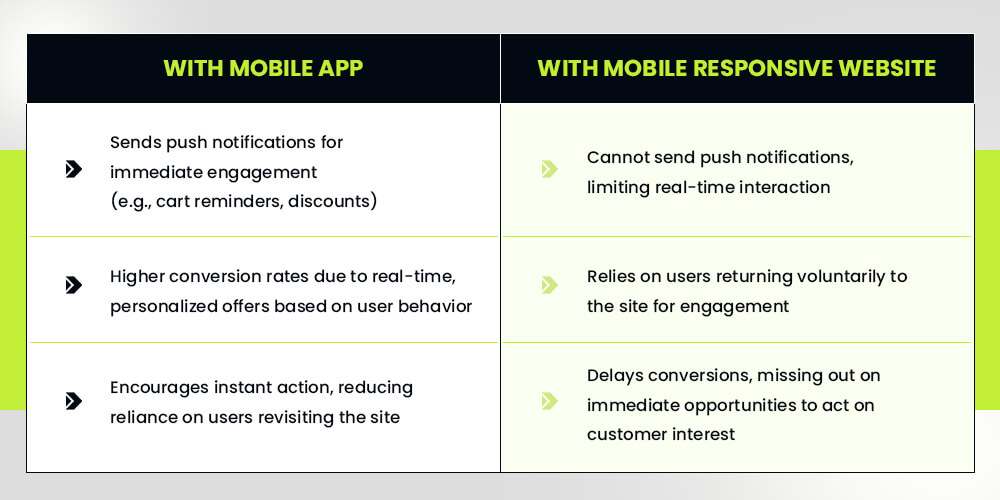
How Mobile Apps Boost Conversion Using Push Notifications
Imagine a shopper at an online clothing store browses through the latest jackets, adds one to their cart, and then decides to leave without completing the purchase. But just a few minutes later, they get a ping on their phone:
“You left a stylish jacket in your cart! Complete your purchase now and enjoy 10% off!“
The notification grabs their attention. They’re already thinking about the jacket, and now there’s an extra incentive. They tap the notification, and within seconds, they’re back in the app, completing the checkout. The beauty of push notifications is that they provide instant engagement, helping brands recover potential sales within moments of abandonment.
How Apps Boost Sales with Effective Remarketing
In-app messaging allows businesses to send highly personalized messages based on a user’s activity. For example, if a customer has shown interest in a particular category of products, the app can display recommendations such as, “You might also like…” or “Check out these new arrivals in your favorite style.”
This targeted approach increases the likelihood of a user returning to the app and making a purchase, which is more effective than the generic messaging typically used on websites.
Why In-App Messaging Is Most Effective Strategy
- Direct interaction: In-app messages appear directly within the app, which means users don’t need to leave or go through additional steps (such as opening an email or clicking on a link).
- Behavior based: The messages are triggered by specific user behaviors, making them more relevant and timely.
- Less intrusive: Since the messages appear while the user is already engaged with the app, they’re less likely to be ignored or dismissed compared to an email or ad.
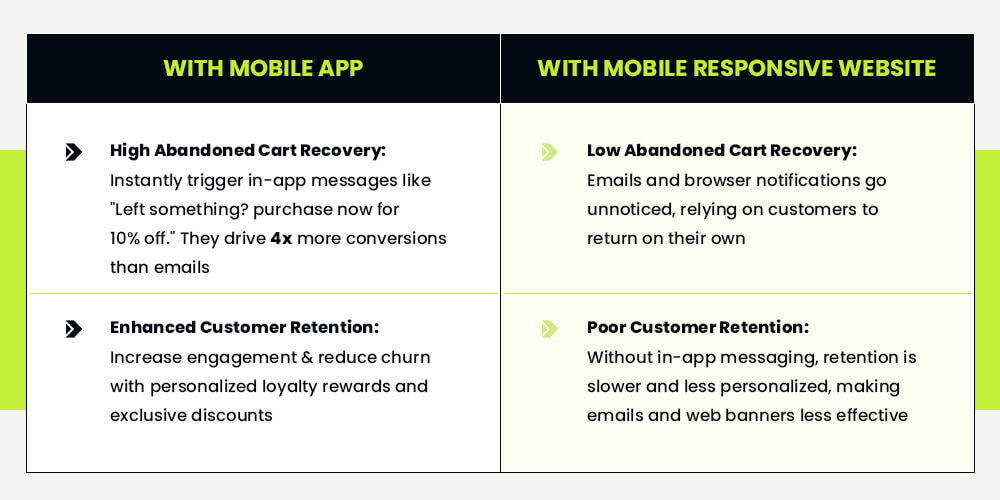
Apps Enable Faster Checkouts and More Purchases But Mobile Responsive Website Can’t
Mobile apps make checkout processes fast and smooth by eliminating unnecessary steps. It lets customers securely store payment details, enabling one-click purchases without re-entering card information.
In contrast, mobile responsive sites often require users to enter payment details each time, unless they’re logged into an account.
Re-entering payment details on mobile responsive sites creates frustration and increases the risk of cart abandonment. Customers expect a quick, seamless checkout. Manually entering card details breaks that flow and adds friction, increasing the chances of cart abandonment.
With mobile apps, you’re creating a frictionless shopping experience that encourages customers to complete the purchase and reduce cart abandonment.
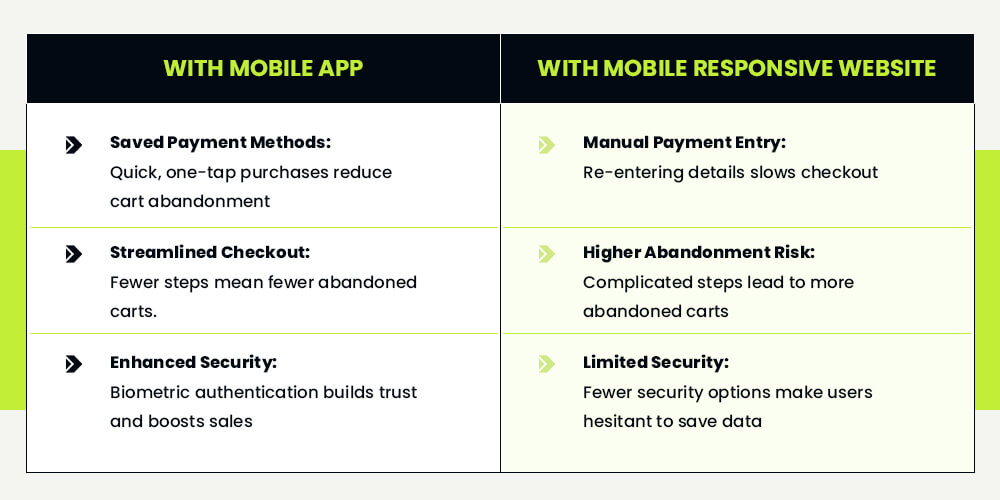
Mobile Apps Reward Loyal Customers and Encourage Them Coming Back
Businesses can easily set up loyalty programs within mobile apps where customers can earn points for purchases, referring friends, or simply interacting with the app. These points can be exchanged for rewards like discounts, free items, or special offers

Starbucks app allows customers to collect stars for every purchase, which can then be redeemed for free drinks or snacks. This simple system encourages customers to keep coming back, as they’re motivated by the rewards they earn with each use.
Customers enjoy earning points through apps because it feels like they’re getting extra value for their regular actions. They appreciate that they can trade those points for discounts or freebies.
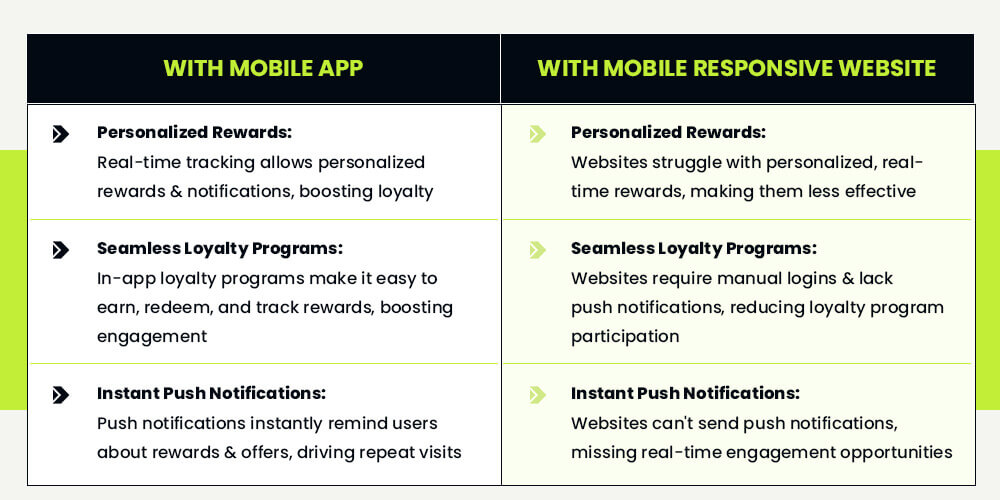
All Things Considered: Build Mobile App For Your Store To Increase Business Profitability
Mobile apps clearly outperform mobile-responsive websites in terms of user experience. It also allows businesses to create deeper connections with customers. By leveraging app-specific data like browsing history and purchase behavior.
With all these advantages, it’s clear that businesses that invest in mobile apps can provide a superior experience, increase customer retention, and ultimately drive higher sales. In an era where customers expect convenience and personalization, mobile apps are no longer optional, they’re essential for staying competitive.
About The Author
I love navigating the world of SaaS with finesse. As an SEO enthusiast and seasoned Copy Writer, I'm here to transform tech-speak into compelling narratives that resonate with online merchants. With a penchant for alliteration and a touch of humor, I bring a unique flair to SaaS content.
Related Posts
Why Mobile App Drives Repeat Customers Better Than Your Website
Repeat customers drive steady revenue, but a website alone is…
Everything You Need to Know Before Building a Mobile App for Your Shopify Store
A few years ago, mobile commerce felt like something brands…
How to Promote Your App on Social Media: Strategies, Platforms, and Tips for Shopify Merchants
Think about the last app you installed. Where did you…